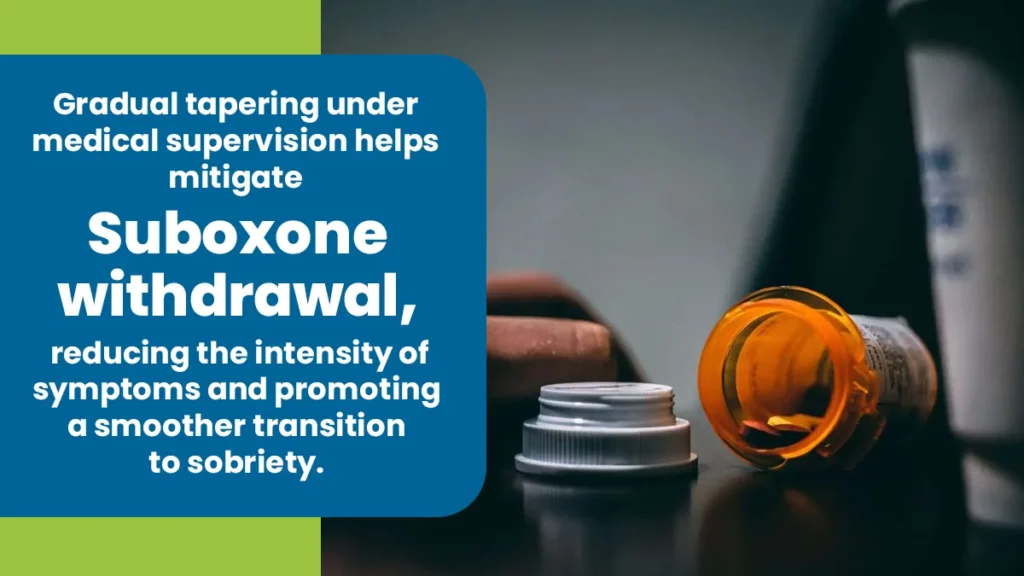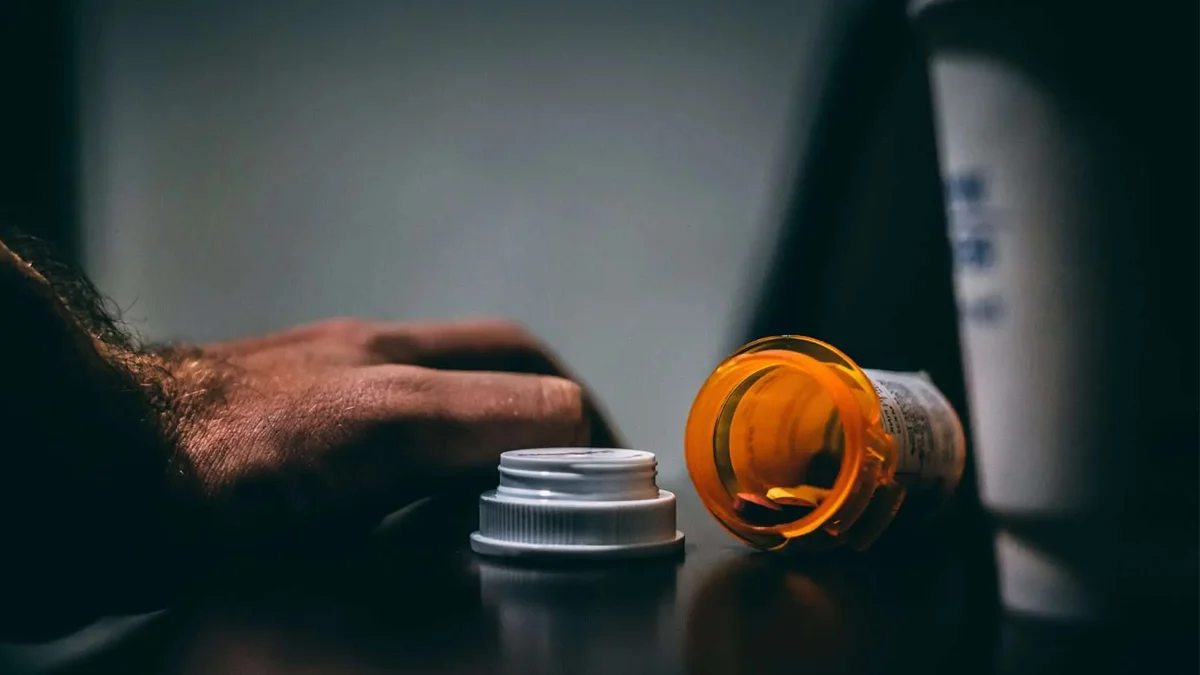Suboxone, a medication used to treat opioid dependence, can bring relief to individuals striving for recovery. However, the cessation of Suboxone usage may trigger withdrawal symptoms, posing challenges to those on the path to sobriety.
Withdrawal symptoms can encompass physical discomfort, such as nausea, muscle aches, and insomnia, as well as emotional turbulence, including anxiety and depression.
From gradual tapering strategies to holistic approaches that address physical and emotional aspects, these proven tips aim to empower individuals seeking a smoother transition toward a drug-free life.
Key Takeaways
Suboxone helps individuals in recovery by blocking the effects of other opioids, minimizing the risk of misuse, and providing a safer path to sobriety. Here’s what you need to know:
- Suboxone withdrawal symptoms can include nausea, sweating, anxiety, and insomnia, often resembling those of opioid withdrawal.
- Gradual tapering under medical supervision helps mitigate Suboxone withdrawal, reducing the intensity of symptoms and promoting a smoother transition to sobriety.
- Seeking professional support during Suboxone withdrawal can offer personalized strategies and medications to manage symptoms and increase the likelihood of a successful recovery.
Contact The Haven Detox-Little Rock (501) 271-3342 for assistance in embracing long-term drug recovery and growth.
Understanding Suboxone Withdrawal
Withdrawal refers to the set of symptoms that occur when a person who is physically dependent on a substance, such as opioids, suddenly reduces or stops their intake of that substance. It is a natural physiological response to the absence of the substance the body has become accustomed to.
Withdrawal symptoms can be uncomfortable and, in the case of opioids, can include symptoms like nausea, vomiting, diarrhea, muscle aches, anxiety, and irritability.
Suboxone withdrawal can occur when a person who has been taking Suboxone for an extended period decides to stop or significantly reduce their dosage.
However, if someone decides to stop taking Suboxone without proper medical guidance, they may experience withdrawal symptoms related to buprenorphine, the partial opioid agonist in Suboxone.
Why Suboxone Withdrawal Occurs
Suboxone withdrawal occurs primarily because of the opioid components within the medication. Buprenorphine, a partial opioid agonist, binds to the same receptors as other opioids, and its sudden removal can lead to withdrawal symptoms.
The addition of naloxone is to deter misuse, as it can induce withdrawal in individuals who attempt to misuse Suboxone by injecting it.
Thus, the combination of these substances creates a delicate balance in the body, and any disruption in this equilibrium triggers the onset of withdrawal symptoms when Suboxone use is stopped or reduced.
Understanding the reasons behind Suboxone withdrawal is crucial for healthcare providers and individuals undergoing addiction treatment to manage and navigate this challenging phase effectively.
Symptoms of Withdrawal
If someone has been taking Suboxone regularly and then suddenly stops or significantly reduces their dose, they may experience withdrawal symptoms.
Common symptoms of Suboxone withdrawal may include:
- Muscle aches and pains
- Nausea and vomiting
- Diarrhea
- Sweating
- Yawning
- Runny nose
- Insomnia
- Dilated pupils
- Anxiety and irritability
- Goosebumps (piloerection)
- Increased heart rate and blood pressure
Withdrawal Timeline
The severity and duration of withdrawal symptoms depend on factors such as the individual’s overall health, the duration of use, and the dosage.
Here’s a general overview of the Suboxone withdrawal timeline:
Early Phase
The early phase of Suboxone withdrawal typically begins within the first 12 to 24 hours after the last dose. During this stage, individuals may experience symptoms such as anxiety, muscle aches, sweating, and insomnia.
The abrupt absence of buprenorphine, a key component of Suboxone, triggers the body’s initial reaction as it adjusts to the absence of opioid receptors.
Middle Phase
Entering the middle phase, which generally spans from days three to five, withdrawal symptoms intensify. This period is marked by heightened physical and psychological distress, including nausea, diarrhea, and mood swings.
The body attempts to recalibrate its neurochemical balance, leading to a challenging phase where individuals may grapple with a strong desire to return to opioid use. Professional support and monitoring become crucial during this phase to manage severe symptoms of drug use and prevent relapse.
Late Phase
The late phase, occurring around the second week and beyond, witnessed a gradual decline in the intensity of withdrawal symptoms. However, lingering effects such as insomnia, fatigue, and lingering psychological symptoms may persist.
The body continues its healing process, gradually restoring its natural equilibrium. Psychological support, counseling, and ongoing care play a pivotal role during the late phase, helping individuals navigate lingering challenges and build a foundation for sustained recovery.
Tips to Manage Withdrawal

Suboxone (buprenorphine/naloxone) is commonly prescribed to manage opioid dependence, and withdrawing from it should be done under the guidance of a healthcare professional. If you or someone you know is experiencing Suboxone withdrawal symptoms, here are some general tips:
Medical supervision
Seek guidance and professional treatment like rapid detox from a healthcare professional, preferably one with experience in addiction medicine. They can create a withdrawal plan tailored to your specific needs to control drug cravings.
Tapering
Gradual tapering of medication is a recommended approach to minimize the severity of withdrawal symptoms. Abruptly stopping Suboxone or going cold turkey can result in more intense and uncomfortable withdrawal experiences.
Tapering allows the body to adjust gradually, making the overall process more manageable.
Hydration and Nutrition
Proper hydration and maintaining a healthy diet are essential during withdrawal. Withdrawal symptoms can be physically demanding, and ensuring adequate hydration and nutrition supports overall well-being during this challenging period.
Rest
Adequate rest is a critical aspect of the recovery process. Sleep disturbances are common during withdrawal, and regular, quality sleep aids the body’s recovery. Rest contributes to physical and mental well-being during this demanding time.
Prescription Drugs
Your healthcare provider may use other medications to help manage withdrawal symptoms. Clonidine is sometimes prescribed to help with symptoms like anxiety, sweating, and agitation.
Supportive Therapies
Engage in counseling or behavioral therapy to address the psychological aspects of Suboxone abuse. Behavioral therapies, such as cognitive-behavioral therapy (CBT), can be beneficial in overcoming substance use disorders.
Mindfulness and Relaxation Techniques
Practices such as deep breathing, meditation, and mindfulness are effective ways to manage stress and anxiety during drug abuse. These techniques help individuals stay centered and focused during the challenging withdrawal period.
Remember, every patient’s experience with withdrawal is unique, and what works for one person may not work for another. It’s crucial to consult with a healthcare professional who can provide personalized advice based on your specific situation.
Suboxone Addiction Recovery
Dependency on Suboxone often stems from attempts to self-manage opioid withdrawal or cravings. Effective treatment involves a comprehensive approach to address this issue. A medical detox program at a treatment facility helps manage withdrawal symptoms, gradually reducing Suboxone dosage.
Behavioral therapies, counseling, and support groups play a vital role in addressing the psychological aspects of addiction and promoting long-term recovery.
Individualized treatment plans, monitored by healthcare professionals, ensure a balanced and gradual tapering process, minimizing withdrawal discomfort. Ongoing support is crucial in preventing relapse, with a focus on building coping mechanisms and addressing underlying issues contributing to addiction.
Combining pharmacological and psychosocial interventions offers a holistic approach to Suboxone addiction treatment, fostering a higher likelihood of sustained recovery.
Frequently Asked Questions (FAQ)
What are the most common side effects of Suboxone?
Common side effects of Suboxone include nausea, vomiting, depression, constipation, headache, insomnia, and sweating. Consult a healthcare professional if these persist or worsen. Studies suggest that serious side effects, although rare, may include allergic reactions, respiratory issues, and liver problems.
Promptly seek medical assistance for unusual symptoms or reactions to ensure proper care and management.
How long does Suboxone affect your body?
The effects of Suboxone typically last for about 24 to 60 hours. However, individual responses may vary. Following prescribed dosages and consulting with a healthcare professional for personalized guidance is crucial. Abrupt discontinuation or misuse may lead to withdrawal symptoms.
Always adhere to medical advice from doctors to ensure safe and effective use of Suboxone in opioid dependence treatment.
What are the effects of Suboxone on withdrawal symptoms?
Suboxone, an opioid antagonist, alleviates opioid withdrawal symptoms effectively. Its ceiling effect reduces abuse potential, making it a valuable medication-assisted treatment for opioid use disorders.
Higher doses offer increased efficacy without heightened risks, supporting patients in overcoming physical dependence. Comprehensive programs, including medical detox and therapy, can help to treat opioid addiction through Suboxone and promote recovery.
Rebuild and Recover With The Haven Detox Little-Rock
Take control of your journey to recovery with The Haven Detox Little Rock.
If you or a loved one is struggling with Suboxone addiction, our comprehensive addiction treatment services can be your guiding light. Our specialized detox and residential treatment programs are designed to manage withdrawal, providing a supportive environment for your healing.
In addition, our experienced therapists employ evidence-based therapies, empowering patients to confront and conquer triggers that fuel drug dependence.It is time to choose a healthier tomorrow. Contact us at (501) 271-3342 now, and let the healing begin.





